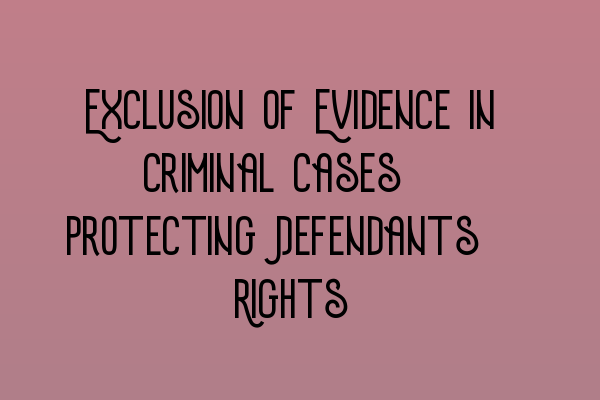Exclusion of Evidence in Criminal Cases: Protecting Defendants’ Rights
When it comes to criminal cases, the exclusion of evidence plays a crucial role in protecting the rights of defendants. Understanding the concept of exclusionary rule and its application is essential for any criminal law practitioner. In this article, we delve into the significance of excluding evidence in criminal cases and its impact on safeguarding defendants’ rights.
What is Exclusionary Rule?
The exclusionary rule is a legal principle that prohibits the use of evidence obtained in violation of a defendant’s constitutional rights. It is based on the belief that illegally obtained evidence should not be used against a defendant in court, as it would violate their right to a fair trial. The exclusionary rule acts as a deterrent to law enforcement misconduct and helps maintain the integrity of the criminal justice system.
Reasons for Exclusion
Evidence may be excluded for various reasons, including:
- Unlawful search and seizure: When law enforcement officers conduct searches or seizures without a valid warrant or probable cause, any evidence obtained during such actions may be excluded.
- Violation of Miranda rights: If a defendant’s Miranda rights, which include the right to remain silent and the right to an attorney, are not properly read or respected during interrogation, any statements or evidence obtained may be excluded.
- Coerced confessions: If a confession is coerced through force, threats, or promises of leniency, it may be deemed involuntary and excluded from evidence.
- Chain of custody issues: When there are doubts about the integrity of the evidence, such as mishandling or tampering, it may be excluded to ensure reliability.
These are just a few examples, and there may be other grounds for exclusion depending on the specific circumstances of each case.
Protecting Defendants’ Rights
The exclusion of evidence is vital for protecting defendants’ rights in criminal cases. By excluding illegally obtained evidence, the court ensures that defendants are not unfairly disadvantaged or prejudiced in their defense. Defendants have a right to a fair trial, and allowing unlawfully obtained evidence can undermine that right.
The exclusionary rule maintains the balance between the State’s interest in prosecuting criminals and the defendant’s right to due process. It serves as a safeguard against government abuse of power and encourages law enforcement to uphold constitutional rights while gathering evidence.
Impact on Criminal Cases
The exclusion of evidence can have a significant impact on the outcome of criminal cases. If key evidence is excluded, the prosecution’s case may be weakened, leading to acquittals or reduced charges. This emphasizes the importance of thorough investigation and adherence to procedural rules by law enforcement agencies.
Moreover, defense lawyers should be well-versed in identifying situations where evidence may be inadmissible and use this knowledge to protect their clients’ rights effectively. Consulting experts or taking preparation courses, like SQE 1 Preparation Courses or SQE 2 Preparation Courses, can help enhance their legal skills and knowledge in this area.
Conclusion
The exclusion of evidence in criminal cases plays a crucial role in protecting defendants’ rights and maintaining the integrity of the criminal justice system. It acts as a deterrent to law enforcement misconduct and ensures a fair trial for defendants. Legal practitioners should be well-versed in the exclusionary rule and its application to effectively protect their clients’ rights.
To learn more about criminal law and practice, you can explore our related articles:
Stay informed about SRA SQE exam dates and make sure to plan your preparation accordingly to excel in your legal career.
